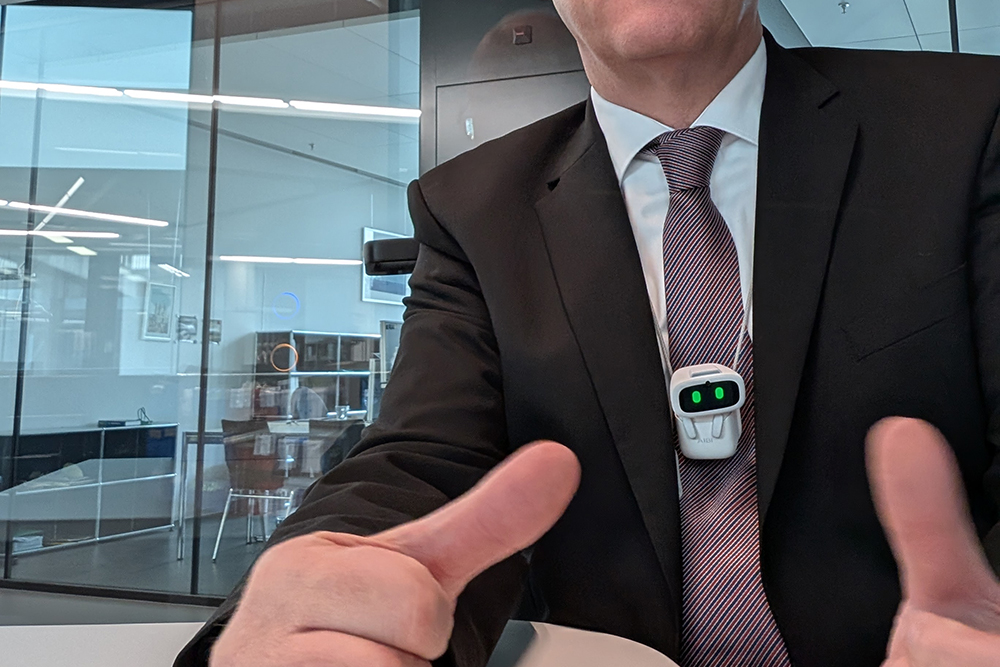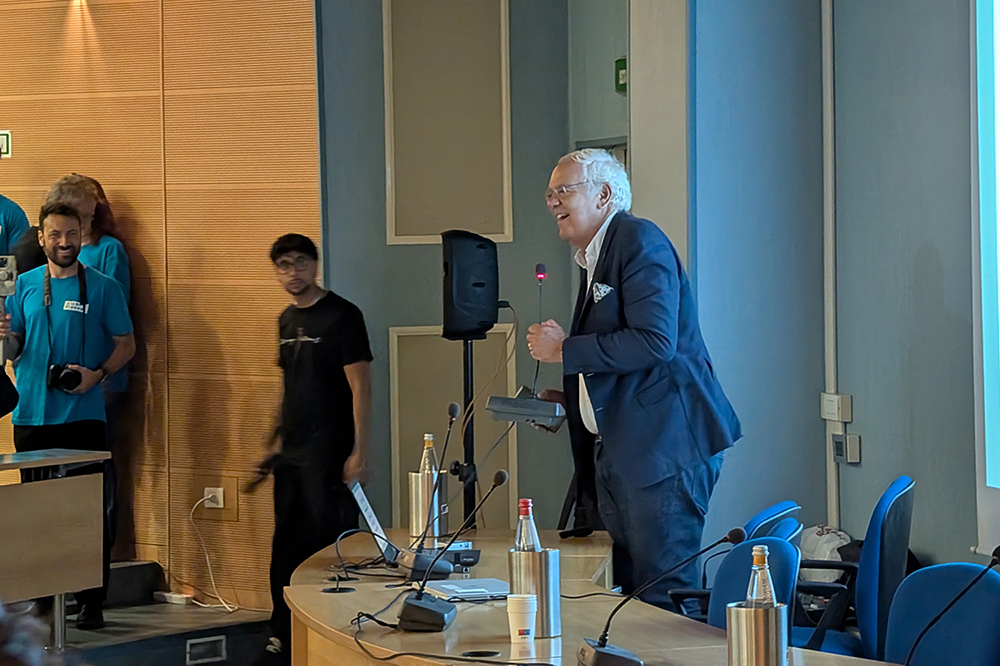The article “Wearable Social Robots in Space” by Tamara Siegmann and Oliver Bendel was published on December 23, 2025. It is part of the volume “Social Robotics + AI: 17th International Conference, ICSR+AI 2025, Naples, Italy, September 10–12, 2025, Proceedings, Part I.” From the abstract: “Social robots have been developed on Earth since the 1990s. This article shows that they can also provide added value in space – particularly on a manned flight to Mars. The focus in this paper is on wearable social robots, which seem to be an obvious type due to their small size and low weight. First, the environment and situation of the astronauts are described. Then, using AIBI as an example, it is shown how it fits into these conditions and requirements and what tasks it can perform. Possible further developments and improvements of a wearable social robot are also mentioned in this context. It becomes clear that a model like AIBI is well suited to accompany astronauts on a Mars flight. However, further developments and improvements in interaction and communication are desirable before application.” The Swiss student presented the paper together with her professor on September 10, 2025, in Naples. It can be downloaded from link.springer.com/chapter/10.1007/978-981-95-2379-5_33.
The Rise of General-purpose Robots
The paper “The Universal Robot of the 21st Century” by Oliver Bendel was published in February 2025 in the proceedings volume “Social Robots with AI: Prospects, Risks, and Responsible Methods” … From the abstract: “Developments in several areas of computer science, robotics, and social robotics make it seem likely that a universal robot will be available in the foreseeable future. Large language models for communication, perception, and control play a central role in this. This article briefly outlines the developments in the various areas and uses them to create the overall image of the universal robot. It then discusses the associated challenges from an ethical and social science perspective. It can be said that the universal robot will bring with it new possibilities and will perhaps be one of the most powerful human tools in physical space. At the same time, numerous problems are foreseeable, individual, social, and ecological.” The proceedings volume comprises the papers presented at Robophilosophy 2024 in Aarhus. Leading philosophers, computer scientists and roboticists met there in August. Like the ICSR, the conference is one of the world’s leading conferences on social robotics. General-purpose robots, the predecessors of universal robots, have now become widespread, as exemplified by Digit, Apollo, and Figure 03. The author accepted manuscript of this article is therefore being made freely available on this site for non-commercial use only and with no derivatives, in line with the publisher’s self-archiving policy.
ICSR 2026 is Ready for Submissions
The 18th International Conference on Social Robotics (ICSR + Art 2026) will take place in London, UK, from 1–4 July 2026. ICSR is the leading international forum that brings together researchers, academics, and industry professionals from across disciplines to advance the field of social robotics. The conference has now opened its submission system, and full details can be found on the official ICSR 2026 submission page (icsr2026.uk/submission). Authors are invited to submit to a range of categories. Regular Papers for the Main Track should follow the guidelines provided on the conference website and be submitted by 15 February 2026. Special Session submissions follow the same Regular Paper instructions but are directed to individual sessions listed on the Special Sessions page. Short Papers follow their own dedicated instructions and are submitted through the same system. Competitions and Debates each have their own portals, with submissions due by 1 March 2026. Additional tracks such as the Robot Fringe and Travel Grants will be announced soon. All submission links and instructions are clearly detailed on the ICSR 2026 submission page, ensuring authors have everything they need to prepare their contributions for this major event in social robotics.
Call for Special Sessions at ICSR
The 18th International Conference on Social Robotics (ICSR + Art 2026) will take place in London, UK, from July 1–4, 2026. ICSR is the leading international forum that brings together researchers, academics, and industry professionals from across disciplines to advance the field of social robotics. The conference is accepting special session proposals on a rolling basis until the submission deadline. Approved sessions will be added here as they are confirmed. The deadline for submitting proposals for special sessions is 1 December 2025. Further information is available at icsr2026.uk. Two special sessions have already been accepted, namely “SS01: Cultural Robotics” and “SS02: Participatory Futures in Social Robotics and AI”.
Initial Thoughts on Wearable Social Robots
Wearable social robots are very small yet extremely powerful systems that can be worn around the neck, on the body, or in a shoulder bag or handbag. They are not only companions to humans, but become part of them by expanding their senses and means of expression. The article entitled “This robot suits you well!” (subtitle: “On the phenomenon of wearable social robots”) by Oliver Bendel defines the term “wearable social robots”, presents areas of application, and discusses social and ethical challenges. Recommendations for developers and users are also provided. It becomes clear that wearable social robots represent novel tools and extensions or enhancements of humans, whose capabilities go beyond those of apps on smartphones. The article was published on September 25, 2025, in Wiley Industry News, not only in German but also in English. It can be accessed at www.wileyindustrynews.com/de/fachbeitraege/dieser-roboter-steht-ihnen-aber-gut or www.wileyindustrynews.com/en/contributions/that-robot-suits-you-well.
The 17th Edition of the ICSR
Mariacarla Staffa (University of Naples Parthenope, Italy) opened the ICSR 2025 on September 10, 2025, together with Bruno Siciliano (University of Naples Federico II). The ICSR is one of the leading conferences for social robotics worldwide. The 17th edition takes place from 10 to 12 September 2025 in Naples, Italy. Daniela Rus (MIT) then gave her keynote speech on “Physical AI”. From the abstract: “In today’s robot revolution a record 3.1 million robots are now working in factories, doing everything from assembling computers to packing goods and monitoring air quality and performance. A far greater number of smart machines impact our lives in countless other ways – improving the precision of surgeons, cleaning our homes, extending our reach to distant worlds – and we’re on the cusp of even more exciting opportunities. Future machines, enabled by recent advances in AI, will come in diverse forms and materials, embodying a new level of physical intelligence. Physical Intelligence is achieved when AI’s power to understand text, images, signals, and other information is used to make physical machines such as robots intelligent. However, a critical challenge remains: balancing AI’s capabilities with sustainable energy usage. To achieve effective physical intelligence, we need energy-efficient AI systems that can run reliably on robots, sensors, and other edge devices. In this talk I will discuss the energy challenges of foundational AI models, I will introduce several state space models and explain how they achieve energy efficiency, and I will talk about how state space models enable physical intelligence.” The approximately 300 participants at the renowned conference on social robotics applauded and then went on to parallel sessions featuring lectures, workshops, and poster presentations.
When Animals and Robots Meet
The volume “Animals, Ethics, and Engineering: Intersections and Implications”, edited by Rosalyn W. Berne, was published on 7 August 2025. The authors include Clara Mancini, Fiona French, Abraham Gibson, Nic Carey, Kurt Reymers, and Oliver Bendel. The title of Oliver Bendel’s contribution is “An Investigation into the Encounter Between Social Robots and Animals”. The abstract reads: “Increasingly, social robots and certain service robots encounter, whether this is planned or not, domestic, farm, or wild animals. They react differently, some interested, some disinterested, some lethargic, some panicked. Research needs to turn more to animal-robot relationships, and to work with engineers to design these relationships in ways that promote animal welfare and reduce animal suffering. This chapter is about social robots that are designed for animals, but also those that – for different, rather unpredictable reasons – meet, interact, and communicate with animals. It also considers animal-friendly machines that have emerged in the context of machine ethics. In the discussion section, the author explores the question of which of the presented robots are to be understood as social robots and what their differences are in their purpose and in their relationship to animals. In addition, social and ethical aspects are addressed.” The book was produced by Jenny Publishing and can be ordered via online stores.
Robot Rabbits vs. Pythons
Florida is testing a new tool to fight invasive Burmese pythons in the Everglades: robot rabbits. As reported by Palm Beach Post (July 15, 2025), researchers at the University of Florida, led by wildlife ecologist Robert McCleery, have developed motorized toy bunnies that mimic the movement and body heat of real rabbits. Pythons are known to be drawn to live prey, but using real animals proved impractical – so science stepped in. The solar-powered robot rabbits are placed in test areas and monitored by motion-triggered cameras. When something approaches, researchers get an alert. If it’s a python, trained response teams or nearby hunters can react quickly. If needed, scent may be added to increase effectiveness. The project is funded by the South Florida Water Management District. It complements a wide range of state efforts to control python populations, from infrared detection and DNA tracking to the annual Python Challenge. While full eradication is unlikely, these innovative methods offer hope for better control of one of Florida’s biggest ecological threats. A new book contribution by Oliver Bendel entitled “An Investigation into the Encounter between Social Robots and Animals” deals with animal-like robots that interact with animals in the wild. The book “Animals, Ethics, and Engineering” with this book contribution will be published by Jenny Stanford Publishing in August 2025.
About Wearable Social Robots
The market for wearable social robots remains relatively small. As illustrated by the case of AIBI, early models often face typical teething problems, with user forums filled with questions and complaints. Nevertheless, these technologies hold potential for a wide range of future applications, offering support and benefits not only to healthy individuals but also to people with disabilities or impairments. The paper “Wearable Social Robots for the Disabled and Impaired” by Oliver Bendel explores this topic in depth. It defines wearable social robots and situates them within the broader category of wearable robotics. The paper presents several examples and outlines potential application areas specifically for individuals with disabilities. It also addresses key social, ethical, economic, and technical challenges, building on the preceding analysis. The paper has been accepted for presentation at ICSR 2025, which will take place in Naples from September 10 to 12.
NAO Robotics SA
Following the recent news that French robotics company Aldebaran has entered judicial liquidation, RobotLAB has issued a press release to reassure customers and partners of continued support for NAO and Pepper robots. A new company, NAO Robotics SA, is being formed to acquire Aldebaran’s intellectual property and engineering team. Development on the next-generation NAO V7 has already resumed. RobotLAB, a long-time NAO partner since 2009, remains fully operational with robots, parts, and support services in stock. With over 6,500 NAO robots deployed, the company continues to provide training, repairs, and educational tools, including the recently launched NAO AI Edition with ChatGPT integration. RobotLAB emphasized there will be no disruption for current customers and views this transition as a new beginning for the NAO platform.









